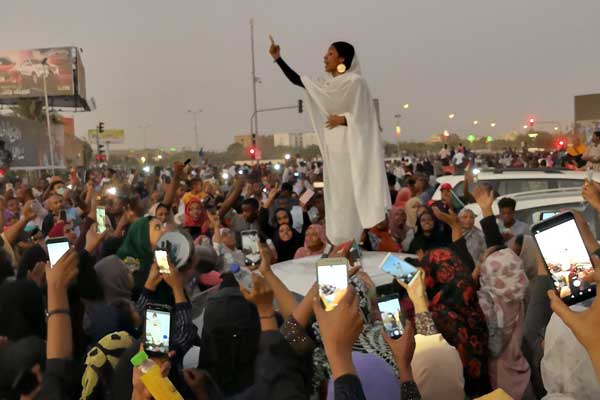Hashtags: Social media continues to shape African politics, years after the "Arab Spring"

Alaa Salah rallies protesters outside a military complex in Khartoum. Photo | Lena Haroun | Bird
What you need to know:
- “In the name of religion, they killed us..." With the crowd responding, “revolution!,” Alaa Salah, 22, spoke truth to power, leading a chant that fuelled the revolution that ousted President Omar al-Bashir following 30 years of autocratic rule in Sudan.
Seth Onyango, bird
“In the name of religion, they killed us..." With the crowd responding, “revolution!,” Alaa Salah, 22, spoke truth to power, leading a chant that fuelled the revolution that ousted President Omar al-Bashir following 30 years of autocratic rule in Sudan.
On social media, she was quickly dubbed the “Nubian Queen” and her image helped ignite a wave of support that transformed Sudan.
This is just one example of how social media is changing political landscapes across Africa.
Garbed in mesh white toub, a cultural Sudanese women's garment –– striking gold earrings and a pair of sneakers –– Salah towered over a crowd of compatriots agitating for political change in central Khartoum.
Minutes after, an iconic photo of her standing atop a car, her index finger piercing the air in defiance outside a military complex, went viral on Twitter.
With the hash-tag #SudanUprising, Salah became a symbol of a revolution that was desperate for a figurehead. In the desert of opposition politics, no figure had yet emerged around whom protesters could unite. It had simply been too dangerous. Now, from nowhere, there was a face to this revolution.
That had huge ramifications for Sudan. The protesters gained international support, with individuals and governments, inspired by Salah’s courage, increasing their calls for an end to the dictatorial regime.
In Sudan’s uprising, like that of other Arab-speaking, North African nations, previously –– Tunisia, Egypt, Libya, famously –– social media galvanised protesters, documented atrocities and rallied international support.
The result: an Arab Spring that continues to reverberate to this day.
Broadcaster and Managing Partner at Insight Strategy Partners (ISP), Kholood Khair, told bird that in Sudan, as in the other North African examples, social media became the melting pot of the aggrieved.
“Social media is where nationalism is allowed to thrive. It has allowed people to see the commonality of their grievances” she said.
Khair drew comparisons between previous Sudanese revolutions and the most recent one, asserting the former were more muted.
Previous revolutions also did not last long or bring about the change the country desperately needed... a problem referred to often by Sudan's own historians.
“In 1964 and 1985, social media was not around then and those revolutions were very domestic and did not translate across the borders...and even within the country they were much based in Khartoum,” she contrasted.
“Therefore, social media has made this (2019) revolution more democratic and also much more far-reaching across the borders.”
More significantly, Khair said, social media roped the Sudanese diaspora into the struggle, creating pressure from abroad in what she termed “revolution from a distance.”
A University of Washington study that analysed more than 3 million tweets, gigabytes of YouTube content and thousands of blog posts, shows the extent to which social media played a central role in shaping political debates in the core upheavals of the Arab Spring.
During the week before Egyptian president Hosni Mubarak's resignation, the total rate of tweets from Egypt — and around the world — about political change in that country ballooned from 2,300 a day to 230,000 a day, the report says.
“Videos featuring protest and political commentary went viral – the top 23 videos received nearly 5.5 million views. The amount of content produced online by opposition groups, in Facebook and political blogs, increased dramatically.”
Social media also allowed the protests to spread.
In January 2011, Egyptians had watched as activists in Tunisia drove out President Zine El Abidine Ben Ali, with massive protests while mobilising on social media.
Twitter hashtags have also shaped revolutions in Africa and helped activists to marshal both local and international support for their course.
From #SudanUprising to #TasgutBas, #BlueForSudan to #KeepEyesOnSudan, Sudan's protesters have been unrelenting in their push for political, legal and other reforms.
The #KeepEyesOnSudan has remained of major importance as the nation still only enjoys a fragile semblance of democracy and stability.
In late September, an attempted coup was thwarted as forces loyal to former leader Bashir attempted to overthrow the Transitional Legislative Council of Sudan.
“Sudan has in the past enjoyed a short period of transitional rule and then back to autocratic rule... then back to the revolution. It is cyclical,” Khair said, asserting that keeping the conversations ablaze on social media prevents the country from backsliding.
Media for Justice in Sudan (MJS), a collective of Sudanese individuals seeking accountability for political victims, launched the hashtag #KeepEyesOnSudan.
“#KeepEyesOnSudan is an important campaign to monitor the progress in #Sudan for the next 18 months. It’s our duty to continue monitoring to ensure a true transition to a civilian-led government. It’s our duty to make sure that justice & accountability are achieved,” MJS programme director Sara Sinada tweeted in July 2019.
Previously, many aspects of the Sudanese women’s lives were controlled in its patriarchal system, including their dress, behaviour, association, and education.
However, because of Salah and the thousands of women protesters (who reportedly outnumbered men during the 2019 protests), that is changing and today, wider freedoms for all is one of the biggest wins of the revolution.
Back to Salah: her courage continues to inspire women across the world to speak out and advocate for their freedom.




